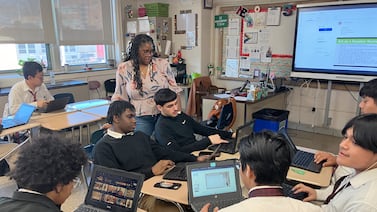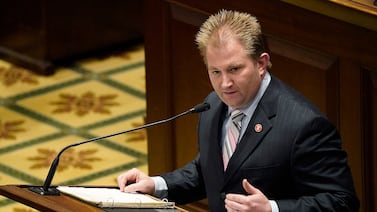Sign up for Chalkbeat Chicago’s free daily newsletter to keep up with the latest education news.
The field of candidates for Chicago’s first school board elections on Nov. 5 continues to narrow, with five more hopefuls booted from the ballot and two more withdrawing.
In all, 47 people filed paperwork with the Chicago Board of Elections to run for school board. But after rulings issued Tuesday by the elections board, 36 remain in the race, though six could still be disqualified.
To get on the ballot, hopeful candidates had to collect at least 1,000 valid signatures from registered voters in their districts between March 26 and June 24. Then, any registered voter in a candidate’s district could file a challenge questioning the validity of those signatures by July 1.
The Chicago Board of Elections reviews each challenge over the course of several weeks. Objectors and candidates often hire lawyers specialized in Chicago election law to argue the case.
The elections board voted Tuesday to affirm a hearing officers’ recommendations that the following candidates did not meet the signature requirements and would not have their names printed on the ballot: Jesus Ayala Jr., Anthony Hargrove, Kernetha Jones, Jousef Shkoukani, and Nathaniel “Nate” Ward. Daniel Steven Kleinman and Rosita Chatonda withdrew.
Jousef Shkoukani was the only candidate at the elections board Tuesday. As a practicing attorney, he chose to represent himself in the case challenging his signatures to get on the ballot for a school board seat representing District 5, which sprawls from the West Loop to Austin.
“I think it just adds an immense layer, and really just disenfranchises a lot of candidates who would otherwise be able to represent their community, and probably in a really important and good way,” Shkoukani told Chalkbeat Tuesday after speaking to the elections board.
After the meeting, Shkoukani said he plans to run again in 2026, when all 21 school board seats will be up for election.
“I think it’s important that the school board has diversity of thought, diversity of candidates,” Shkoukani said.
Several other candidates who have withdrawn in the face of challenges or been removed from the ballot have expressed concerns about ballot access for these first school board elections.
Jesus Ayala Jr., a 2010 graduate of Chicago Public Schools, was running in District 7 to represent parts of the South West side from Archer Heights to Pilsen. Earlier this spring, he had called unsuccessfully on other candidates to make a pact not to challenge one another’s petitions.
“I don’t fully understand Chicago politics. I know the jokes, I know what people say, like, it’s the way it is,” Ayala Jr. said. “But there’s an opportunity here, and we should seize it.”
Speaking to Chalkbeat by phone, Ayala Jr. said he collected just under 2,000 signatures, but after being challenged by Santos Mendez, Board of Elections employees found that 905 were valid.
“It’s hard not to get a little disheartened by the whole thing,” he said. “At the end of day, it is on me, I came up short. I should have worked harder and smarter.”
Carlos Rivas Jr. successfully overcame a challenge to his petition signatures and his name will be printed on the ballot for District 3, which covers Humboldt Park, Logan Square, Hermosa, Avondale, and parts of Belmont Cragin. He said the person who challenged him, Patrick Gibbons II, did something called a “shotgun objection,” in which he challenged 2,800 of the 3,000 signatures submitted.
“We had to go literally line-by-line to search up every single voter that had signed my petitions, which is why it took so many days,” Rivas Jr. said.
Rivas Jr. said it was a sprint to collect enough signatures before the deadline and make sure people signing his petitions lived in the district and were registered to vote in the district in order for their signatures to count. He said it became a part-time second job.
“I’m wondering how difficult this is going to be in two years for someone who has served on the board to then also run a campaign while serving while having a full time job,” Rivas Jr. said. Chicago school board members are not paid.
Now that he’s safely on the ballot, Rivas Jr. said he’ll shift his energy to fundraising and campaigning.
“We have the joy of being able to talk to folks in the summertime,” he said, “Getting out to block parties, talking to neighbors, doing canvassing in the neighborhood, that’s really what I’m what I’m looking forward to, to talk to folks about their wants and needs for the district.”
Becky Vevea is the bureau chief for Chalkbeat Chicago. Contact Becky at bvevea@chalkbeat.org.







